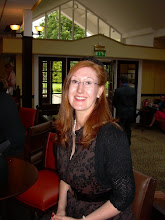 The Ladies of Grace Adieu by Susanna Clarke is a gem. Not just in the contents, but also in the book itself - I won't go on about the materiality of the text, etc, but it's a beautifully designed book, lovely cover and wonderful, ethereal illustrations by the peerless Charles Vess. Actually, the book as a whole rather reminded me of a book of short stories by Walter de la Mare that I had as a child (the name escapes me) with illustrations in a similar style, and stories of similar jewel-like perfection.
The Ladies of Grace Adieu by Susanna Clarke is a gem. Not just in the contents, but also in the book itself - I won't go on about the materiality of the text, etc, but it's a beautifully designed book, lovely cover and wonderful, ethereal illustrations by the peerless Charles Vess. Actually, the book as a whole rather reminded me of a book of short stories by Walter de la Mare that I had as a child (the name escapes me) with illustrations in a similar style, and stories of similar jewel-like perfection.Of course Clarke is best known for Jonathan Strange & Mr Norrell, which I haven't read but have just ordered from Amazon. I can't comment on that well-received work, therefore, but I hope it will be as enchanting as this book. And enchanting is just the right word; it's all about enchantment - Clarke reworks fairytales, or develops her own characters from her earlier novel, creating a world which is entirely seductive. Here, the world of faery mingles with the world we know, bewildering but captivating. Clarke cleverly presents the book as an edited collection by the fictional "Professor James Sutherland, Director of Sidhe studies, University of Aberdeen" (the Sidhe are an ancient race of Celtic fairies - you can read more about them here). This professor introduces the stories as curiosities, relics of another time, collected and edited with footnotes by him. We are therefore invited to read these stories as anecdotes by people who, from the sixteenth century onwards, have actually seen and interacted with fairies. What makes it so intriguing is that the tales are thus placed within an entirely fictional context of a canon of studies which doesn't exist, playing with the boundaries of the academic, the fictional, and genuine research into folk-tales.
I don't think I'm doing it justice here; there is a marvellous wistful quality to Clarke's writing which makes the rhythm of the tales hypnotic; furthermore, she has an excellent ear for the cadences of writing in a certain period; her 18th century prose would do justice to Austen while her Elizabethans are almost (modernised) Spenserian. I don't know anything about Clarke, but I bet she knows her Eng Lit. It's an absolute delight; do read it.











No comments:
Post a Comment